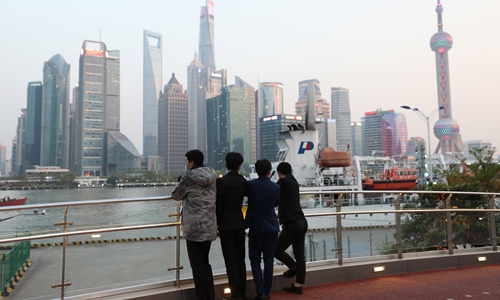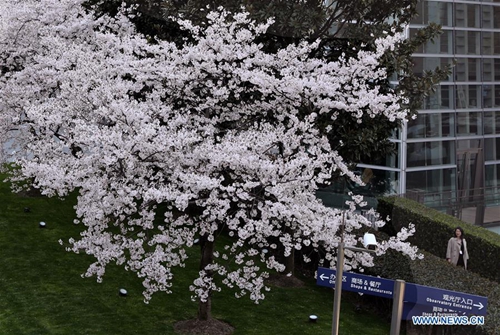Pudong GDP to bounce faster
By GT staff reporters Source:Global Times Published: 2020/4/17 23:23:39 Last Updated: 2020/4/18 20:49:39
30th anniversary celebrated amid pandemic

Visitors on the Bund in Shanghai look at the skyline in Pudong New Area across the Huangpu River on Thursday. Pudong will celebrate its 30-year anniversary of opening-up and development on Saturday. Photo: Yang Hui/GT
As economists and organizations penciled in negative growth for the world and below 2 percent growth for China in 2020, Pudong New Area, a region located in eastern Shanghai about the size of New York City, is brave enough to cling to a target of 7 percent growth for the year of 2020, a goal they set around the beginning of the year and hasn't changed so far even with disruptions from the coronavirus pandemic.
Pudong celebrates its 30th anniversary of development and opening-up on Saturday under the grim backdrop of the pandemic. Experts contacted by the Global Times were not sure if Pudong can make it under the influence of the coronavirus, but all of them agreed that Pudong can achieve a GDP growth well above China's overall economic growth this year with some predicting at about 5 percent as the region's distinctive spirit formed over the years - experimental and opening up - would help it race against the pandemic.
The 1,210-square kilometer area is known for making a "Chinese miracle" by turning from a desolate land plot into one of the most developed, technology-laden regions in China or even the world in just 30 years, achieving a GDP aggregate in 2019 that's almost equivalent to half of Singapore and twice that of Sri Lanka.
Despite an increasing call against globalization, foreign companies in Pudong contacted by the Global Times gave high credits to the Shanghai government for their professional and friendly policies, which strengthened their confidence in investing further in China despite the coronavirus impact.
From the setup of China's first comprehensive supporting reform pilot area in Pudong in 2005 to the founding of Shanghai free trade zone in 2013 and the establishment of Lingang Industrial Zone in 2018, Pudong has always had an "experiment" label which mirrored its DNA of courage and pioneer, Xie Guoping, the former deputy chief editor of Pudong Times newspaper, told the Global Times.

A woman walks past blooming cherry blossoms in Lujiazui of Pudong New Area, east China's Shanghai, April 1, 2019. (Photo:Xinhua)
Spring after winterFrom rows of made-in-China Model 3s that drive out of Tesla's plant to lines of robots being churned out at ABB's new robot factory, enterprises in Pudong are among the first batch of companies in China that got back on the horse after an extended closure triggered by the epidemic.
AstraZeneca is one of those Pudong-based foreign companies that made a rapid reaction to the epidemic, resuming work at the earliest time they could but also making a flexible adjustment to their original working model to ensure that work is both safe and efficient, such as launching online digital platforms and tools for remote working and offering online training lessons.
As of press time, at the company's China headquarters located in Pudong, all of the employees, about 1,700, have resumed work.
They also received ample support from the local government of Pudong, which helped solve problems with the working visa of their foreign employees in Shanghai and ushered in more policies, like targeted tax and fee cuts.
"China's economy has shown strong resilience for decades. This gives us confidence that the impact of the epidemic on the economy is temporary... we believe there's spring after each winter and we will continue to support China's economic development in action," Leon Wang, executive vice president, International and China President at AstraZeneca, told the Global Times.
Like AstraZeneca, foreign companies approached by the Global Times all expressed a similar intention to remain in the Chinese market despite the pandemic impact.
Citibank China, whose Chinese headquarters are based in Pudong, said in a note it sent to the Global Times that it maintained optimism about China's long-term economic prospects despite some challenges from the pandemic and that they will further expand measures like making international trade services more electronically based.
"Based on confidence in China's policy and an understanding of China's economic structural reforms, we believe Shanghai and Pudong will continue to be the frontier of China's economic growth and innovation," the company noted.
Will Song, the Chairman of Johnson & Johnson China, also told the Global Times that he is "very impressed by the tremendous efforts the Shanghai government has invested to contain the COVID-19, from giving a detailed recommendation of self-protection, to implementing comprehensive measures to reduce transmission in public, which serve as a great foundation for businesses to make arrangements accordingly."
"We are also encouraged by the government's supportive measures from providing fast-track customs clearance for overseas donations, expediting transportation for medical and daily supplies, to putting forward multiple favorable policies and strong support to help businesses resume work and operation in a safe and steady manner," Song said.
Some foreign businesses in Pudong are shifting their investment focus to survive winter.
While the pandemic brought short-term challenges to foreign companies in Pudong, it also brought impetus for further business readjustments for them.
For example, Hidefumi Mizutani, Managing Director of Itochu Shanghai LTD, a Japanese trade and investment company, said that his company is looking to shift investment focus from traditional industries, like clothing and food in the past, to new industries like energy from waste and telemedicine in the next decade in China.
"We are half concerned about coronavirus and half not, as we have experienced a similar epidemic - SARS - before, but we still have worries about business prospects after a 30 percent drop in sales from January to March. In general, we are still optimistic about the future of the Chinese market," he said. Itochu is the first wholly foreign-owned enterprise in Pudong.
Xi Junyang, a professor at the Shanghai University of Finance and Economics, said that Pudong's farsighted choice of high value-added industries like high-end manufacturing, finance, and biology has made it more resilient against external threats like COVID-19 because the products are irreplaceable for their technology.
From Tesla, Citibank and AstraZeneca that propelled Pudong's 30-year development, it's not difficult to see how the new area welcomes financial, high technology companies and future industries.
But Xi also said that coronavirus would bring some impact to the region's growth this year, as he forecast about 5 percent growth this year for Pudong and 3-4 percent growth for China.
A beacon in anti-globalization wave
Experts noted that the development of Pudong could provide a significant reference to the economic and social development of other countries and regions at a time when anti-globalization is on the rise as the coronavirus spreads worldwide.
"Pudong is a successful case in China's reform and opening up. The region's experience shows what opening-up means to a place, and why global economic integration is the general trend," Xie Guoping said. "Today's Pudong also gives us the confidence to understand what we have done right since the reform and opening up," Xie noted.
Thirty years ago, there was nothing but some scattered ports, warehouses and farming fields in Pudong. People living in Pudong had to take a ferry to Puxi (western area of Huangpu River) to see the doctor for serious illness or go to theaters. Now, in every square kilometer in Pudong, there are about two high-tech enterprises. It is also home to 240 overseas-invested research centers and 332 regional headquarters for overseas companies, not to mention the numerous infrastructure facilities and public consumption places, Xie said.
While the US and Japan are reportedly encouraging their companies to withdraw from China, Pudong and Shanghai are still winning foreign investment and companies. On April 10, Shanghai issued certificates to 21 international companies as an acknowledgment of settling down their regional headquarters in the city, among which eight are in Pudong.
In addition, 21 key foreign investment projects, worth more than $1.7 billion, were also settled in Pudong on February 26 via an online signing ceremony, which covers different sectors including supply chain management, medical equipment, intelligent manufacturing, and asset management.
Zhu Ying, an economics professor with the School of Finance and Business of Shanghai Normal University, told the Global Times that foreign investment will keep coming into China despite the influence of the pandemic.
"There is not any other big market as China," Zhu said. "For instance, Tesla came to Pudong to set up a factory amid the twisty period of China-US trade war. It will not easily leave (because of external setbacks) as it is dedicated to developing the Chinese market."
CG Lai, CEO of BNP Paribas (China) Ltd, whose Chinese headquarters are located in Pudong's financial zone Lujiazui, told the Global Times he thought Lujiazui has some of the most professional, market-understanding and friendly-to-overseas-investors government officials in China and some organizations help coordinate communication between overseas companies and the government regulators.
"This can be hardly seen in other places in China. We are grateful for that, and it intensifies our ambition to explore the Chinese market," Lai said.
Posted in: SOCIETY